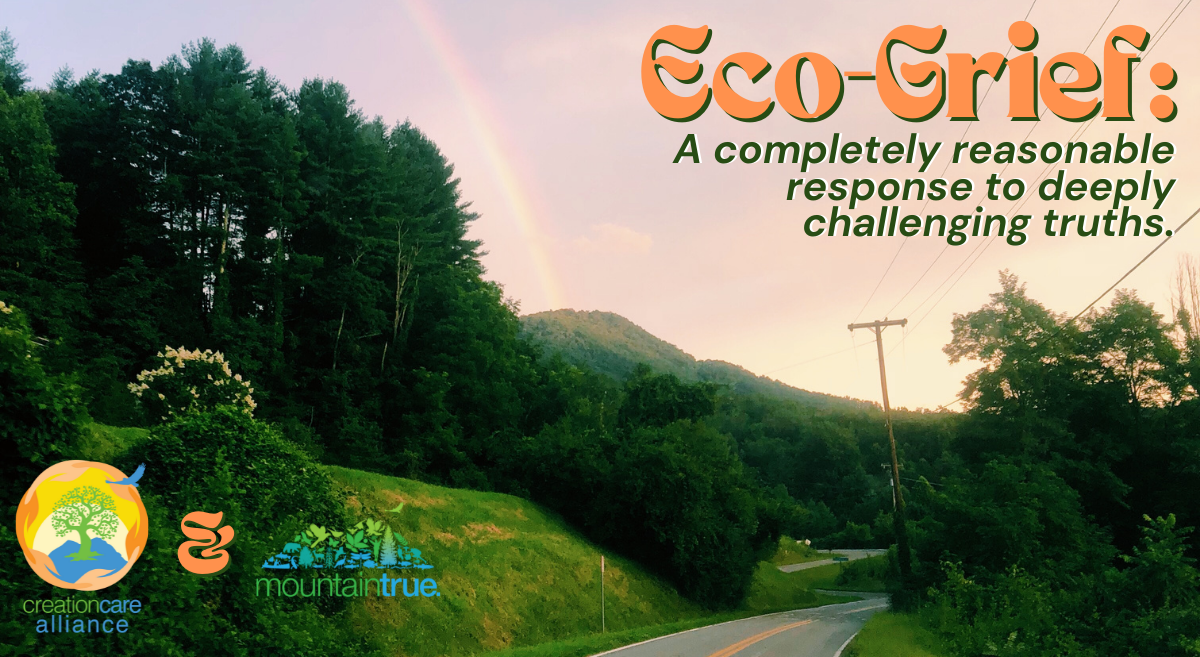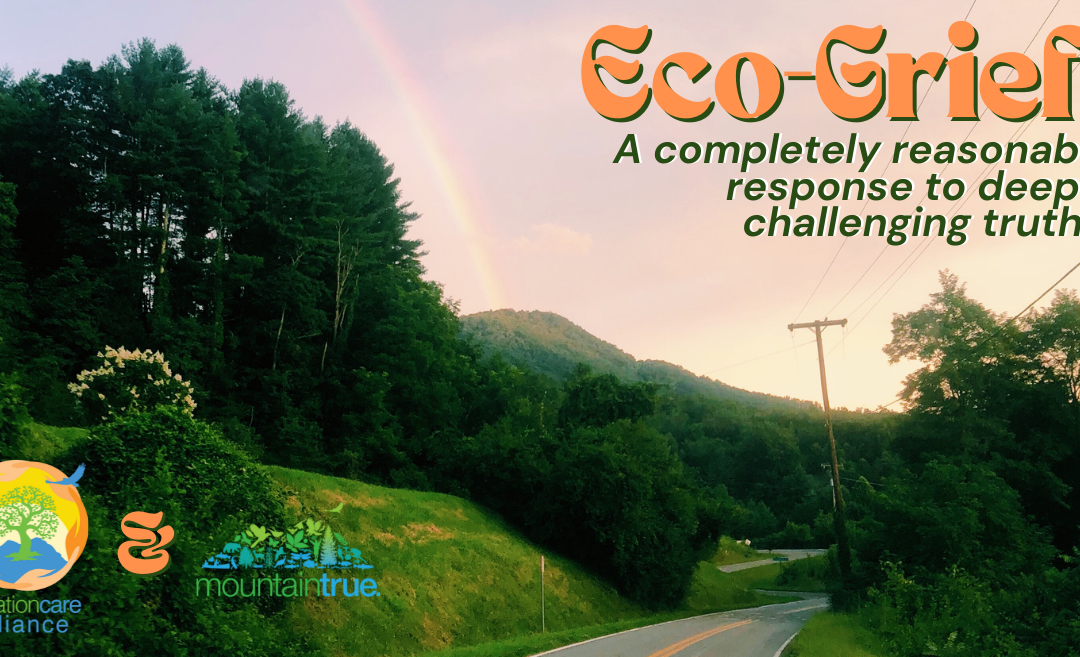MountainTrue and The Creation Care Alliance of WNC on Eco-Grief

It’s hard to keep up with the news and harder still to process.
We see images of fires raging across the American west, driving both human and non-human communities from their generational homes. We hear farmers speak, in choked sobs, of unpredictable growing seasons and lost crops. We shake with the knowledge that we are losing species at 10 to 100 times the rate considered “natural” by scientists. We witness persistent environmental racism inflicted upon BIPOC (Black, Indigenous, and People of Color) communities. We live in a reality in which BIPOC and low-income communities are the most affected by climate change and most frequently excluded from climate conversations.
Many of us find ourselves numb with grief and overwhelmed by the pain of the world we love. In other words, many of us are experiencing ecological grief and climate anxiety — completely reasonable responses to deeply challenging truths.
As we grapple with our changing climate and the devastation of natural spaces, we may feel fear, sadness, anger, or a sense of despondency. We may feel burnt out. It may be challenging to plan for “the next thing.” It may be difficult to do anything other than try to “fix the problem,” making it impossible to rest. This is why recognizing and processing ecological grief is so important.
Together, we can learn to navigate and be present in the world as it is — grounding our lives and our activism and perhaps discovering hope and community in the process. As Francis Weller says, “grief and love are sisters.” By honoring our grief, we can develop a clearer understanding of why we care for this world in the first place and ultimately reconnect to our love for it.
Those working at the intersections of climate and environmental justice often suffer from depression and anxiety. The impacts of climate change — like increasingly frequent and severe storms and the damage they leave in their wake — can lead to panic attacks and PTSD in impacted populations. Activists, educators, and vulnerable communities all deserve support in addressing the mental and physical health aspects of being climate-informed and climate-impacted. We and many others are striving to provide that support to all in our mountain communities who are in need and interested.
The Creation Care Alliance of WNC — MountainTrue’s faith-based program — began offering seven-week-long Eco-Grief Circles virtually in the fall of 2020 to help meet the needs of our community members struggling with ecological grief and climate anxiety. These Eco-Grief Circles are led by environmental advocates, counselors, and pastors, and sessions are inspired by the work of Francis Weller and Joanna Macy. In past meetings, participants provided mutual support, healing, and insight as they explored grief and sorrow, anxiety and fear, guilt and shame, anger, despair, and emotional integration. Participants expressed profound gratitude for being among people who could talk honestly about grief, suffering, and the ecological and social challenges of our time.
Since 2020, our grief group offerings have evolved substantially. What began as a local, online effort to offer support has blossomed into an initiative supported by various organizations and individuals internationally and throughout the United States. We’ve hosted in-person and virtual groups (serving more than 150 individuals), offered training and curriculum to support others as they lead their communities in this work, and we’ve spoken on panels for national organizations about our offerings and learnings.
Click here to learn more about eco-grief and our Eco-Grief Circles and click here to learn more about our current eco-grief efforts. Because our current Eco-Grief Circles have limited capacity, we continue to consider the next iteration of this work and how we can achieve that developing vision.
We know the need for this work continues. We know that many others are championing this necessary work in their own communities, both physical and online. We’re deeply inspired by the thought-leaders, educators, creators, innovators, and activists at:
- The All We Can Save Project, whose mission is “to nurture a welcoming, connected, and leaderful climate community, rooted in the work and wisdom of women, to grow a life-giving future.” The All We Can Save Project offers an anthology of helpful and empowering resources, including resources for educators, climate emotions, and information on starting your own All We Can Save Circles.
- Marine biologist and climate solutions communicator Dr. Ayana Elizabeth Johnson — The All We Can Save book co-editor, along with Dr. Katharine Wilkinson.
- Intersectional Environmentalist (IE), who provide accessible and inclusive, educational, and empowering resources — “IE is a climate justice community and resource hub centering BIPOC and historically under-amplified voices in the environmental space.”
- Earthrise Studio, whose “goal is to humanize the impacts of the climate crisis by sharing the diverse experiences of those living on the frontlines of climate change and the activists who have devoted their lives to tackling it.”
- The Work that Reconnects Network, whose mission is to “help people discover and experience their innate connections with each other and the self-healing powers of the web of life, transforming despair and overwhelm into inspired, collaborative action.”
- The BTS Center, whose mission is to “catalyze spiritual imagination with enduring wisdom for transformative faith leadership.” The BTS Center offers various programs providing support in eco-grief and is also one of the partners supporting the Creation Care Alliance’s upcoming Eco-Grief Circles.
Have additional resources you’d like to share? Want to learn even more about our eco-grief offerings? We invite you to reach out to us! In the meantime, we’ll continue to learn from and listen to the climate activists, community educators, and creators leading the charge (including those mentioned above) so that we’ll be better equipped to engage with our communities as we process ecological grief and climate anxiety together.

